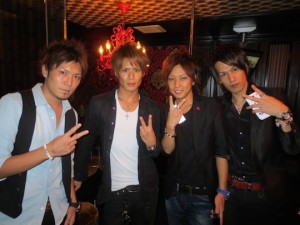Staged Seduction: new book examines Tokyo host club culture
Staged Seduction: Selling Dreams in a Tokyo Host Club is a new book by Akiko Takeyama, published by Stanford University Press. It is an ethnographic study of the men and women who produce and consume love in Japan’s host clubs, examining not only the “fixed times and formal spaces” like the late-night sessions in the clubs themselves, but also beyond.
Why it is very easy to find media reports and articles about hostesses, male hosts are less famous outside of Japan.

And yet arguably, this is the more interesting phenomenon, since there are bars and clubs where you pay to hang out with beautiful girls (and perhaps have sex with them) all over the world. Yet ones where flamboyantly dressed men — huge hair dyed brown and blond — serving champagne to rich women? Surely this is more revealing about Japanese society and what women need.
“Commodified romance” is how Takeyama’s academese describes the culture, which actually goes back to the first host club in the mid-1960s.
In the host clubs of Tokyo’s Kabuki-chō red-light district, ambitious young men seek their fortunes by selling love, romance, companionship, and sometimes sex to female consumers for exorbitant sums of money. Staged Seduction reveals a world where all intimacies and feigned feelings are fair game for the hosts who employ feathered bangs, polished nails, fine European suits, and the sensitivity of the finest salesmen to create a fantasy for wealthy women seeking an escape from the everyday.
Akiko Takeyama’s investigation of this beguiling underground “love business” provides an intimate window into Japanese host clubs and the lives of hosts, clients, club owners, and managers. The club is a place where fantasies are pursued and the art of seduction isn’t merely about romance; a complex set of transactions emerges. Like a casino of love, the host club is a site of desperation, aspiration, and hope, in which both hosts and clients are eager to roll the dice. Takeyama reveals the aspirational mode not only of the host club, but also of a Japanese society built on the commercialization of aspiration, seducing its citizens out of the present and into a future where hopes and dreams are imaginable—and billions of dollars can be made.
We have only read extracts but it seems very interesting.
Based on the author’s PhD thesis, the book highlights how hosts are self-employed, “independent agents who exercise autonomy over their tables”. The relationship between the club owner/manager and the hosts is not a similar boss-employee one.
Also she explains how easy it becomes to share information with host; how they put you at ease and offer insights readily into their lives and backgrounds. The hosts, like many others, are seeking alternatives to conventional lifestyles and jobs in neoliberal Japan, though the extent to which they are “free” or exploited by their clientele is debatable.
The hosts’ body movements—lighting cigarettes, mixing drinks, flirting, and laughing—were highly stylized and exaggerated. They made every possible effort to please their clientele. Surrounded by this attention, unusual for women in Japan’s male-centered society, I felt like a celebrity. In the club, women were excused from traditional feminine roles and instead experienced what it was like to be cared for by men.
Though I was swept away by all of the attention, I wondered why these hosts asked me such personal questions. Were they actually interested in my research? Or did they simply treat me as they would any client? They asked, among other things, how much I enjoyed drinking alcohol, where I lived, and what my hobbies were. I came to realize that their inquiries were designed to gauge my wealth and whether I might solicit their hosting services again.
Host clubs increased in number during the 1980s and 1990s, by which time their negative, sleazy image had declined in favor of a glitzy reputation perfect for the bubble economy years. Kabukicho developed as the center of the scene. The hosting industry now generates around $1.5 billion in revenue each year, thanks to the roughly 700 bars and clubs nationwide, and 12,000 hosts. Kabukicho alone has some 300 establishments and 5,000 hosts, all competing for women’s attention and yen.














